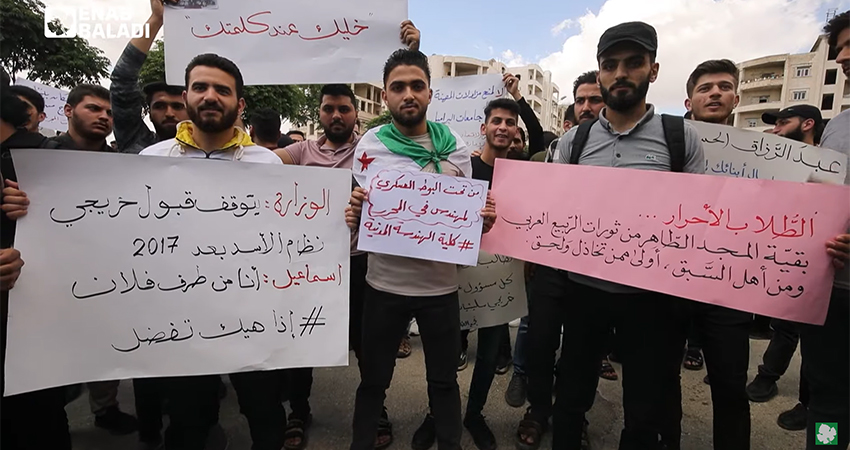On 12 May 2024, the Salvation Government of the Hay’at Tahrir al-Sham (HTS) in Idlib province, northern Syria, requested the head of the committee responsible for following up on the implementation of Decision No.623 to withdraw the recognition of professional licenses and certificates issued after 30 June 2019 by Syrian universities outside the “liberated areas”.
This came after student protests erupted in Idlib in late April 2024. Earlier, in March 2024, the faculties of Pharmacy, Civil Engineering, and Education in the Free Idlib University of the opposition released separate statements (Annex 1) denouncing the failure to implement the decision of the Salvation Government, which aimed to prevent the post-2016 graduates of Syrian universities and institutes outside its areas from employment. The students considered these decisions insincere and described them as “false and empty promises.”
In the same vein, on 2 May 2024, several students from Idlib University declared an open strike because of “the Salvation Government’s recognition of the certificates of the new graduates from Syrian regime universities and granting them professional licenses.”
- What are the Powers of the Decision Follow-up Committee?
The committee, established by Resolution 92 and comprising 17 members, was assigned two main tasks: (1) to study the degrees granted by universities in regime-controlled areas after 31 December 2016 and (2) to evaluate the certificate granted by universities in opposition-held areas to extend their holders benefits equivalent to those of graduates from universities accredited by the Ministry of Higher Education in the Salvation government.
On 5 September 2022, the Salvation Government issued Decision No. 532, which prohibits graduates from regime universities and institutes after 2016 from working for its ministries and affiliated agencies, except under certain conditions. These conditions include obtaining equivalence of the academic qualification from the Ministry of Higher Education in the Salvation Government and residing in the areas under its control for a minimum of five years. Additionally, the decision gave the graduates of Syrian universities in the “liberated areas” (Idlib and its countryside) priority for appointments.[1]
An employee of the Salvation Government living in Idlib confirmed to Syrians for Truth and Justice (STJ) that,
“About 470 people holding regime certificates and working in jobs in northern Syria were arrested within twenty days of the decision being issued.[2] They faced measures such as work suspension, contract cancellations, and prevention from practicing their professions in the private sector.”
The source added,
“Students who had suffered from bombing and displacement should have priority in education and work in the liberated areas.”
In this brief report, STJ documents violations related to the arbitrary dismissal of hundreds of employees in Idlib due to the Salvation Government’s decision. Many of these employees graduated from Syrian universities in regime-controlled areas between 2016 and 2018. They now face an uncertain future after being arbitrarily dismissed from their jobs, even though Decision No. 623 of the Salvation Government does not include them, as it requested the withdrawal of professional licenses issued after 30 June 2019. Student protests in Idlib contributed to the arbitrary dismissals of their colleagues who graduated from universities outside Syria’s north.
- Dismissals Despite the Need for Employees
Noha Ahmed (a pseudonym), a midwife, is one of those affected by the Salvation Government’s addressed decision. Noha described to STJ her suffering, saying:
“After graduating from Homs University in 2016, I received training and worked in Homs’ hospitals. However, due to the persecution by the Syrian regime, I moved to Idlib in September 2016. I found work in several hospitals and clinics in Idlib and became the sole breadwinner for my family after my husband was martyred in October 2018 and my brother was arrested by the Syrian regime. On 14 May 2024, the hospital administration where I work informed me that my contract, along with those of five of my colleagues, was terminated based on a decision by the Salvation Government.”
Despite the urgent need for medical staff in the region, Noha found herself unemployed with no hope of finding a new job due to restrictions on holders of degrees from universities of the Syrian government. In this context, she added:
“Before the revolution, we all studied at the regime’s universities. What is my fault if I am a graduate of the regime’s universities that my work should be stopped? My brother was arrested by the regime, and my husband was killed by the regime. Is this fair? This decision must be reconsidered; it is wrong by all standards.”
Abdul Qader Latouf (a pseudonymous), a nurse in the health sector, stated that the Salvation Government’s decision had catastrophic consequences for many employees and their families. They were prohibited from pursuing professions that required a university degree, such as working as a pharmacist’s assistant or a nurse in a private clinic. He expressed his concerns regarding this issue,
“I graduated from the Medical Institute in Aleppo in 2017. I then worked in several hospitals and clinics in the city and gained diverse nursing experience, including first aid and assisting surgeons and physicians. On 2 February 2020, I moved to Idlib after facing persecution by the Syrian intelligence services for assisting a friend in escaping to Türkiye. In Idlib, I worked with various medical organizations. However, on 14 May 2024, I and five colleagues were summoned by the Salvation Government and informed that we were being dismissed from our positions.”
Abdul Qader expressed his concern after the decision was issued. He said,
“Those who are graduating from Idlib universities now are not qualified to work in medicine immediately. They do not have enough experience for practical work. After this decision, there will be a great shortage of medical expertise in Idlib hospitals. This decision has caused us great harm on all levels – financially, psychologically, and physically. This has impacted not only me but also my family and hundreds of families residing in Idlib province.”
- Forcing Several Humanitarian Organizations to Lay Off Employees
Ibrahim (a pseudonym), a human resources officer, relocated to Al-Dana in Idlib after unsuccessful attempts to avoid military service and the ongoing war. He stated:
“I graduated from the Faculty of Administrative and Financial Sciences at Latakia University in 2017. After facing several unsuccessful attempts to seek asylum in Türkiye, I chose to settle in Idlib and search for employment within humanitarian organizations. In 2018, I began working and held positions at various international and local organizations. When student protests erupted in Idlib, calling for the dismissal of individuals holding degrees from the Syrian regime, the Salvation Government decided to terminate the employment of those individuals. On 15 May 2024, the organization’s management informed me and my colleagues that our contracts were being terminated.”
Ibrahim added,
“The confusion left by the decision in our souls was very harsh. It has brought hundreds of families and me to rock bottom. In addition to the bitterness of war and the high cost of living, the Government’s decisions further burden us. While I hold a university degree from Latakia University, it doesn’t mean that I support the Syrian regime. Like everyone, I wanted a degree recognized in all Arab and foreign countries.”
Testimonies collected by STJ’s field researchers confirm that these decisions will negatively affect the region. Many essential professional experts, such as doctors, nurses, and pharmacists working in the humanitarian field, will be lost. This is considered disastrous for many families in Idlib, especially the displaced.
- The Salvation Government Postpones Objections Indefinitely
Nassar Nasr (a pseudonym), the director of a civil society organization operating in Idlib, northern Syria, confirmed to STJ that the decision of the Salvation Government has led to divisions among Idlib people; some support the decision, some oppose its time period, and some completely reject it. He pointed out that the decision prevented people who obtained university degrees from the Syrian government after 2019 from practicing their professions. He said in this context:
“On 17 May 2024, our volunteer team in Idlib received a notification from the Ministry of Higher Education of the Salvation Government. The notification requested that the educational certificates of our team’s employees who graduated after 2016 from the regime’s universities be submitted to the committee responsible for educational affairs, even though the announced decision stipulates certificates after 2019. Our team has two employees who graduated from government universities in 2018 and 2020. On 22 May 2024, the Ministry of Higher Education correspondence officer visited our team’s office and handed an official letter informing us that both employees were dismissed and prevented from practicing their jobs under penalty of legal liability without providing further details or information.”
Nassar elaborated on the action taken against the employees, saying,
“Unfortunately, we had to terminate their contracts. However, I informed one of them, the 2018 graduate, that he needed to go to the Ministry of Higher Education building to meet the committee, as the decision did not ban him from practicing his work. The next day, he went to the ministry building and requested to meet with the committee or one of its officials. The doorman took his name and information and contacted one of the offices. The response was that the committee was under a lot of pressure, and he would have to wait two months before meeting with them without providing him with an official appointment.”
Regarding the negative effects of the Salvation Government’s decision to revoke licenses for professional practice in Idlib, the organization’s director told STJ:
“As the administrative team, we condemn these misguided decisions, which are detrimental to the interests of civilians in all areas of liberated northern Syria. Holding a university degree from the regime does not necessarily imply support for or involvement in its criminal acts. Each individual has their own reasons that may have forced them to live in different geographical areas.”
STJ field researchers met with some protesters who support the Salvation Government’s decision to understand their views. Among them was a graduate of the Faculty of Agricultural Engineering at the University of Aleppo, who expressed his support for the decision by saying,
“We are the ones who paid the price. We were abandoned, arrested, and suffered hardships. A university student with a degree from regime areas does not deserve to be employed and work within the areas of the revolution. Their work in the areas of the revolution deprives our university graduates of employment and work.”
The source added,
“We will continue to demand through student demonstrations that the public and private institutions of the revolution be for the youth and sons of the revolution only.”
A teacher in Idlib expressed satisfaction with the decision, stating,
“We have not accepted and will not accept graduates of Assad’s universities. Our students are the priority in our universities, and working in the liberated [areas] is reserved for our university graduates only. Those of us who have endured the horrors of war should have priority in job opportunities.”
Idlib University, which is not internationally recognized even by the Turkish government, was ranked 18,953 globally and 23rd locally by the Webometrics Ranking of World Universities. According to the university’s official website, it has around 18,000 students and employs more than 600 staff members.
According to the official website of Idlib University, which is affiliated with the Ministry of Higher Education in the Salvation Government, the university was established in 2015 after the Syrian government lost control over the region, and teaching began in 2016. The establishment of Idlib University dates back to 2006, when it was known as the Second University of Idlib. It was affiliated with the University of Aleppo and included most of its faculties.
- Legal Opinion and Comment
STJ believes that the addressed Salvation Government’s decision and its subsequent implementation measures violate the right to work, a basic human right that is shrined in many international covenants and conventions. For example, the Universal Declaration of Human Rights of 1948 states, “Everyone has the right to work, to free choice of employment, to just and favorable conditions of work and to protection against unemployment.” (Article 23.1), International Covenant on Civil and Political Rights of 1966 states that every citizen shall have the right and the opportunity “To have access, on general terms of equality, to public service in his country.” (Article 25.c), and International Covenant on Economic, Social and Cultural Rights of 1966 states, “The States Parties to the present Covenant recognize the right to work, which includes the right of everyone to the opportunity to gain his living by work which he freely chooses or accepts, and will take appropriate steps to safeguard this right.” (Article 6.1).
The Salvation Government’s discrimination based on the geographical location of the institution or university from which a person graduated and its assumption that everyone residing in areas controlled by the Syrian regime is loyal to it – even without proof of that – is considered discrimination based on political opinion. This constitutes a clear violation of the principle of equality, as stipulated in international covenants and conventions.[3]
The Salvation Government cannot justify its decision and subsequent related practices by claiming it is not a State or a party to international conventions. The Guiding Principles on Internal Displacement, which are based on international human rights and humanitarian law and are meant to guide States, organizations, authorities, groups, and individuals in their interactions with internally displaced persons, state in principle 22 that internally displaced persons have the right to seek employment and participate in economic activities freely.
The Salvation Government has dismissed individuals who were not supposed to be affected by the decision. The decision stated that work permits should be withdrawn from individuals who obtained their certificates after 30 June 2019. However, testimonies obtained by STJ confirm that the decision has also impacted individuals who graduated before this date. This clearly violates the decision, indicating that it was implemented arbitrarily for political reasons unrelated to the law. This suggests that the decision was a political act to achieve unlawful political goals.
Annex 1 – Copies of the statements issued by students from the Faculty of Civil Engineering, Pharmacy, and Education in Idlib, demanding the withdrawal of the work permits of their colleagues who graduated from other Syrian universities.
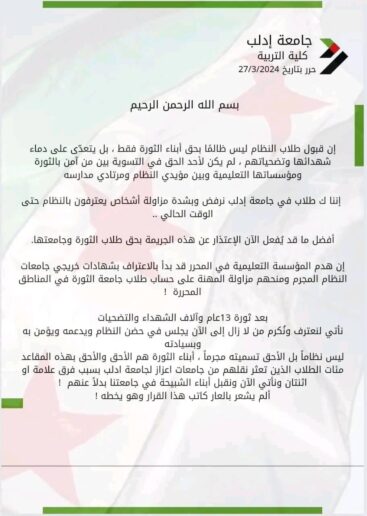
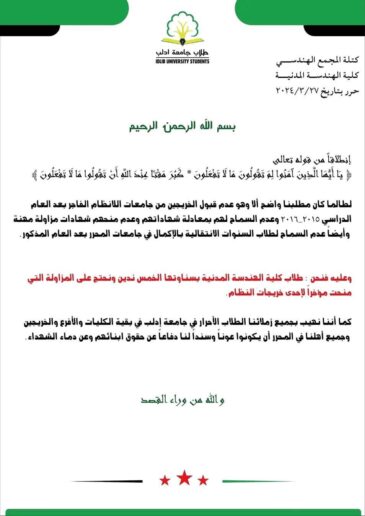
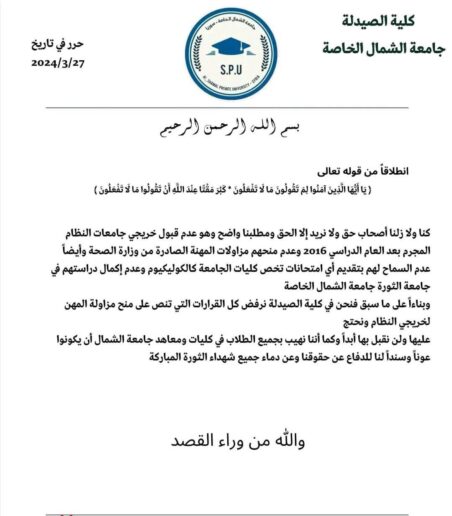
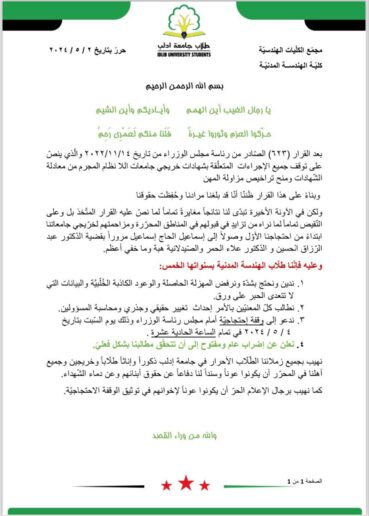 ______________________________________________________________________________________________________________________________________
______________________________________________________________________________________________________________________________________
[1] Note: Syrians for Truth and Justice (STJ) has discovered that the decision was referred to with two different numbers. The decision was initially addressed with number 623 by the head of the committee responsible for implementing it, and later with number 532 when it was officially issued on 5 September 2022.
[2] The interview was conducted online on 31 May 2024.
[3] Article 2 of the Universal Declaration of Human Rights and Article 2 of the International Covenant on Civil and Political Rights and International Covenant on Economic, Social and Cultural Rights.

